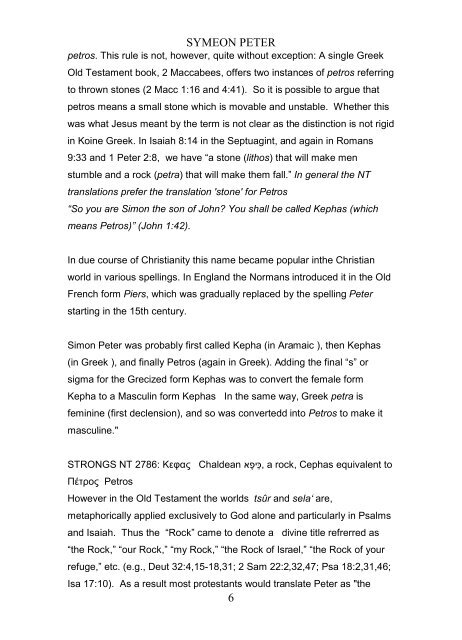You also want an ePaper? Increase the reach of your titles
YUMPU automatically turns print PDFs into web optimized ePapers that Google loves.
SYMEON PETER<br />
petros. This rule is not, however, quite without exception: A single Greek<br />
Old Testament book, 2 Maccabees, offers two instances of petros referring<br />
to thrown stones (2 Macc 1:16 and 4:41). So it is possible to argue that<br />
petros means a small stone which is movable and unstable. Whether this<br />
was what Jesus meant by the term is not clear as the distinction is not rigid<br />
in Koine Greek. In Isaiah 8:14 in the Septuagint, and again in Romans<br />
9:33 and 1 <strong>Peter</strong> 2:8, we have “a stone (lithos) that will make men<br />
stumble and a rock (petra) that will make them fall.” In general the NT<br />
translations prefer the translation 'stone' for Petros<br />
“So you are Simon the son of John? You shall be called Kephas (which<br />
means Petros)” (John 1:42).<br />
In due course of Christianity this name became popular inthe Christian<br />
world in various spellings. In England the Normans introduced it in the Old<br />
French form Piers, which was gradually replaced by the spelling <strong>Peter</strong><br />
starting in the 15th century.<br />
Simon <strong>Peter</strong> was probably first called Kepha (in Aramaic ), then Kephas<br />
(in Greek ), and finally Petros (again in Greek). Adding the final “s” or<br />
sigma for the Grecized form Kephas was to convert the female form<br />
Kepha to a Masculin form Kephas In the same way, Greek petra is<br />
feminine (first declension), and so was convertedd into Petros to make it<br />
masculine."<br />
STRONGS NT 2786: Κεφας Chaldean ,ּכֵיפָא a rock, Cephas equivalent to<br />
Πέτρος Petros<br />
However in the Old Testament the worlds tsûr and sela‘ are,<br />
metaphorically applied exclusively to God alone and particularly in Psalms<br />
and Isaiah. Thus the “Rock” came to denote a divine title refrerred as<br />
“the Rock,” “our Rock,” “my Rock,” “the Rock of Israel,” “the Rock of your<br />
refuge,” etc. (e.g., Deut 32:4,15-18,31; 2 Sam 22:2,32,47; Psa 18:2,31,46;<br />
Isa 17:10). As a result most protestants would translate <strong>Peter</strong> as "the<br />
6


















